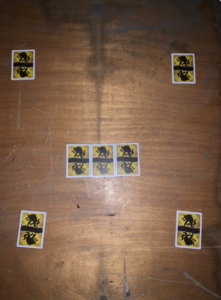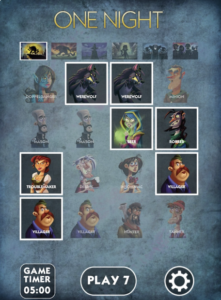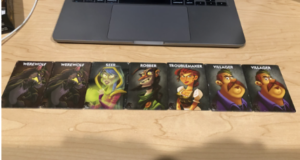- Name of game, creator, platform
- One Night Werewolf is created by Ted Alspach. It is a card game, and we also use a mobile App for moderation.
- The card game:

- The app:

- Target audience (as best you can discover from research or the games messaging)
- The target audience is quite broad, playable for all ages and all kinds of groups from total strangers to friends.
- Notable elements of the game: how many players? What actions can players take? How do rounds work? Do they do anything interesting with player relationships/objectives/resources? (refer to Formal Elements for this!)
- We played the game with 4 players. The players perform various actions based on their characters for one night, and then vote to determine the werewolf in the next day, which ends the game. Some characters do really interesting things with player relationships and objectives: While being a team competition game like original werewolf, the team arrangement is dynamic because some character can swap/change roles of the players, and sometimes the true identity is even unknown to the player themselves! This adds a whole new kind of dynamics to the game: the player not only need to communicate or hide their own identity, but also need to figure out/help others to figure out their own identity.
- Compare the game you chose to other games in its genre. What differentiates it from the other games? Is it better/worse? How so?
- The game is much more fast paced, everything ends in one round with no repetition.
- To makes the game dynamics still interesting, the minimal set of characters need to be enriched (villager, seer, werewolf, robber, trouble maker). On the other hand, it requires less player (4 players are playable).
- Minimal set of cards:

- It’s definitely better for small groups, as other games in the social deduction genre are hardly playable with small number of players. On the other hand, I think for larger groups, a slower-paced game with intricate deduction would be more fun.
- Was the game fun? Why or why not?
- Yes. There are lots of tensions and surprises concentrated in a short amount of time, creating a fast positive feedback for the players.
- Moments of particular success or epic fails (in your opinion)
- Every time when we reveal the identity and it turns out someone fooled all of us! It’s the moment of surprise.
- Things you would change to make the game better
- Add some interactions between successive rounds to create longer dynamics.

The Mechanics of Magic
Game Design Writings by Students at Stanford taking 247G and 377G

